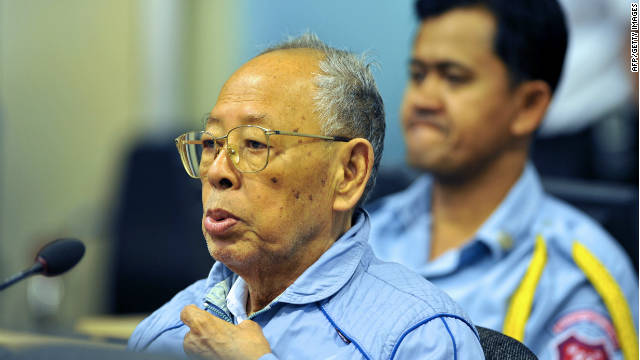 Former Khmer Rouge
Deputy Prime Minister Ieng Sary died Thursday, escaping judgment for war
crimes at the hands of a tribunal. He is pictured here in the Phnom
Penh courtroom in 2011.
Former Khmer Rouge
Deputy Prime Minister Ieng Sary died Thursday, escaping judgment for war
crimes at the hands of a tribunal. He is pictured here in the Phnom
Penh courtroom in 2011.
HIDE CAPTION
March 14, 2013
(CNN) -- It was one of the worst genocides since the
Nazi era. The brutal Khmer Rouge took over Cambodia in 1975 and
terrorized the population for four years, killing more than one million
people.
One of its infamous leaders died Thursday, escaping judgment for war crimes at the hands of a U.N. tribunal.
Ieng Sary passed away in the capital Phnom Penh at age 87, the United Nations-backed court for Cambodia said.
He was the foreign minister under, and the brother-in-law-of, Khmer Rouge dictator Pol Pot.
On Tuesday, he was hospitalized for stomach pains.
The Extraordinary
Chambers in the Courts of Cambodia -- the U.N.-backed court -- will
establish the cause of death before releasing his body to his family.
 A look at Cambodia's 'killing fields'
A look at Cambodia's 'killing fields'
Ieng Sary's death leaves just two defendants facing judgment by the tribunal.
His wife, Ieng Thirith, was excluded from the case after she was deemed unfit to stand trial in September 2012.
But charges of torture
and murder will continue against the remaining defendants -- former
nominal head of state Khieu Samphan and former prime minister Nuon Chea.
Proceedings halted
Following Ieng Sary's death, Amnesty International asked the court to continue with its proceedings without delay.
"The news of Ieng Sary's
death will be difficult for the victims of the Khmer Rouge crimes who
have waited so long for justice," said Rupert Abbott of the human rights
group.
The court has faced
criticism that it has proceeded too slowly with the trial. The
defendants are more than 77 years old, and more of them could die before
facing judgment.
On Tuesday, proceedings
came to a grinding halt after local staffers walked out, saying they
will not return until they are paid wages owed by the cash-strapped
court for the last three months.
A bloody period
Pol Pot came to power as
a communist revolutionary after toppling the U.S. backed government in
Phnom Penh, when American troops left the region in 1975 at the end of
the Vietnam war.
For the next four years,
the communist Khmer Rouge under Pol Pot was blamed for the deaths of
some 1.7 million people through torture, execution, hard labor and
starvation.
Pol Pot's rule became known as the era of the killing fields when cities were emptied and residents slaughtered.
A Vietnamese invasion in 1979 forced the Khmer Rouge to retreat back to the jungle.
The dictator died in 1998 before the tribunal's existence and never faced trial.
Double jeopardy?
The Vietnamese who
invaded Cambodia quickly put Ieng Sary on trial and convicted him in
absentia in 1979. When he defected from what remained of the broken
Khmer Rouge regime in 1996, the Cambodian king pardoned him.
The defense for Ieng
Sary once argued that the case against him should be dismissed on
grounds of double jeopardy -- a defendant cannot be tried twice for the
same crime.
The court considered the motion.

No comments:
Post a Comment